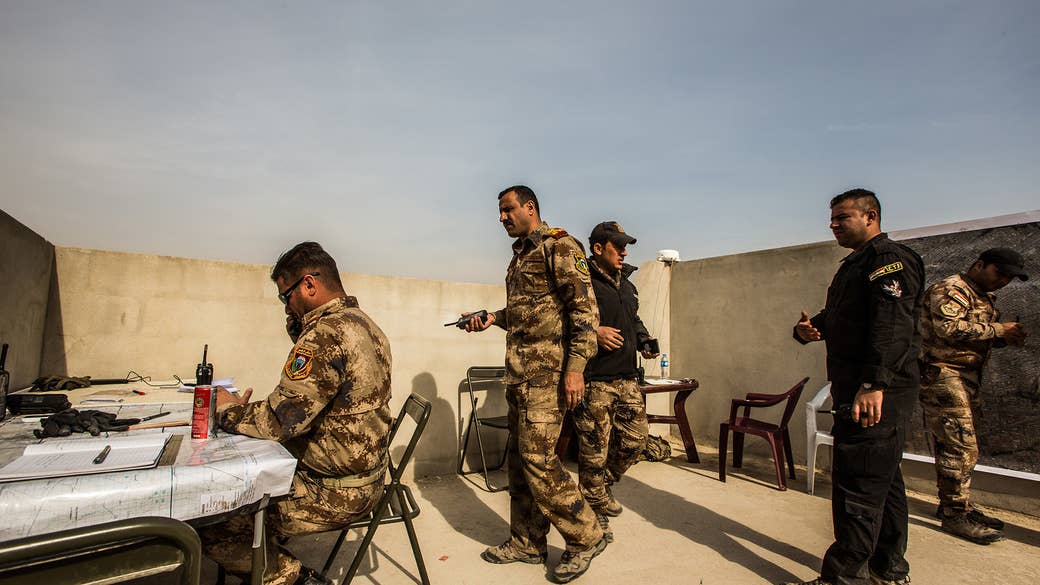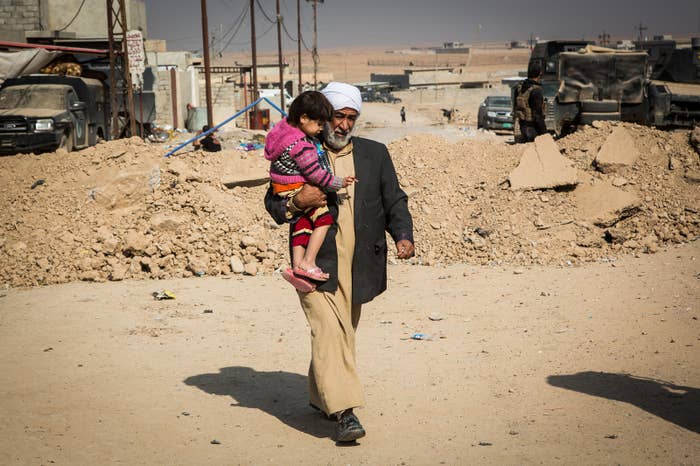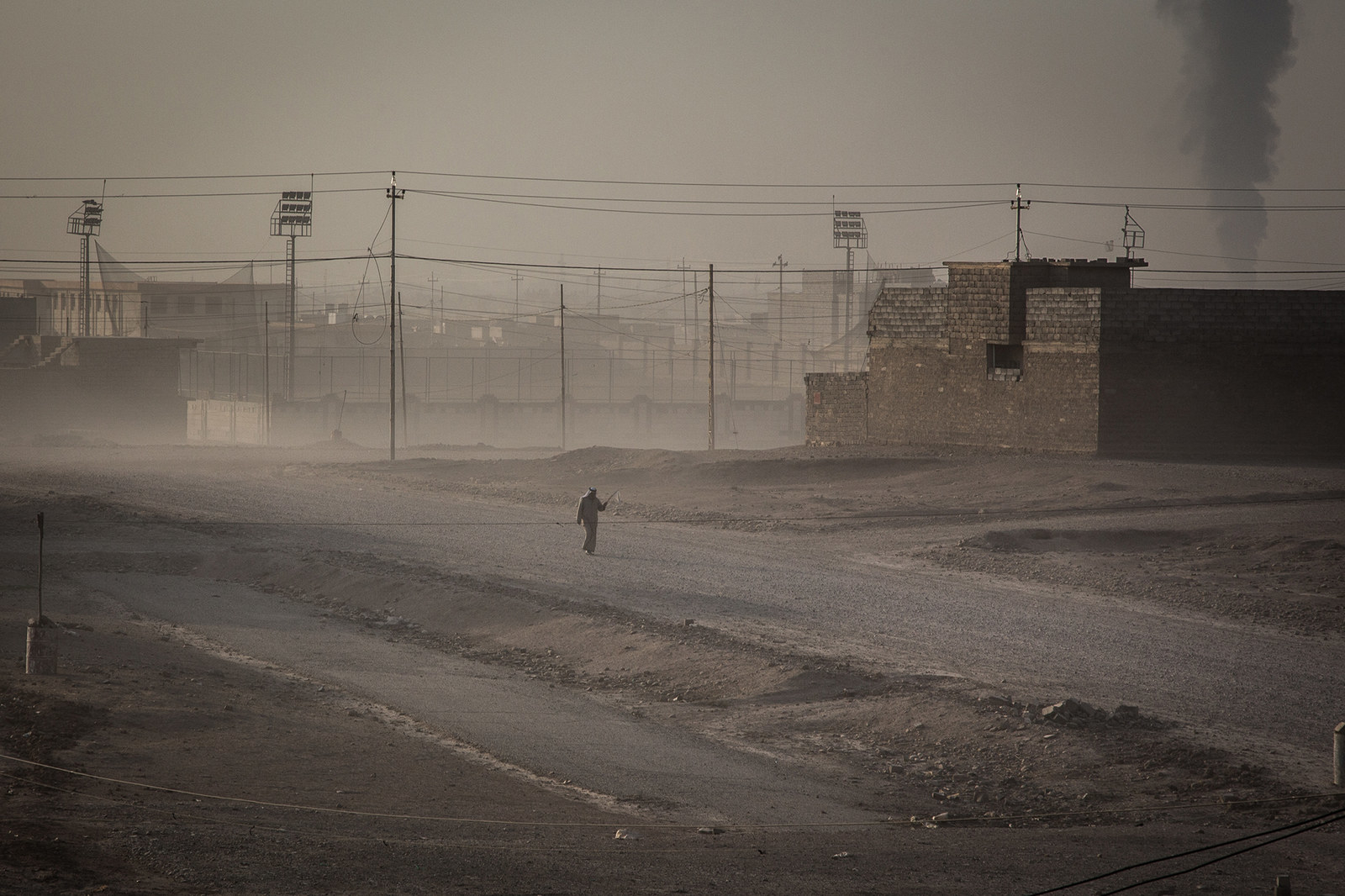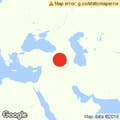
MOSUL, Iraq — As Donald Trump was declared the president-elect on Wednesday, a team of Iraqi special forces officers were calling in US-led airstrikes from a rooftop in Mosul.
The group of Iraqis were far more cautious about the lives of civilians caught up in the war with ISIS than Donald Trump has vowed to be when he takes charge as the next commander-in-chief.
Two US attack helicopters hovered overhead. A drone and an F-18 fighter jet circled the sky. But when an Iraqi colonel received an airstrike request from a commander on the ground ahead — to destroy a road they suspected would be used by an approaching car bomb — he canceled it because of the threat to civilians nearby. "The guys have accepted the risk, and they're going to block the road with whatever assets we have on the ground and hope for the best," said the colonel, Arkan, who wanted to be identified by first name only for security reasons.
His call was in line with US rules of engagement for the conflict designed to limit civilian casualties. These decisions put Iraqi forces at greater risk — and their overall push to protect civilian lives in Mosul has contributed to the battle's grinding pace.
Yet time and again over the course of the offensive, Iraqi commanders have painted this caution as a key part of their strategy. They say that winning Mosul with as little civilian suffering as possible is crucial to keeping the extremists from coming back. "Move slow and no bleeding," is how one commander leading the charge in Mosul, Maj. Salam Hussein, often describes his plan of attack.
"You don't want to be responsible for unnecessary deaths," Arkan said from the rooftop. "I'm here to defend them, not kill them. So if I have that open fire show it's not going to help. And keep in mind we have to rebuild whatever we destroy."

Trump suggested during his campaign that he will push the US military to have its drone operators and pilots carry out indiscriminate attacks against ISIS — which would take a heavy civilian toll — claiming that restrictions on civilian casualties have hampered the war against the extremists.
“I will quickly and decisively bomb the hell out of ISIS,” Trump said in a radio ad last November, before repeating it throughout his campaign speeches. “I’d blow up the pipes, I’d blow up the refineries, I’d blow up every single inch, there would be nothing left,” he said at an event in Iowa.
But the assessment of Iraqi commanders on the ground in Mosul is that the opposite is needed. On top of their concern for their countrymen, they say that civilian casualties help ISIS.
At least 900 civilians have been killed in the US-led campaign of airstrikes in Iraq since it began in Aug. 2014, according to the monitoring group Airwars. The US has admitted to far fewer.

The US military and its allies are responsible for airstrikes on ISIS targets behind the front lines, but on the field of battle it is the Iraqi forces on the ground who call them in. Lt. Gen. Abdulwahab al-Saedi, the top commander for Iraqi special forces in Mosul, said they are often even more cautious than their US partners when it comes to civilian lives. "We are more serious because we are the ones on the ground," he said. "We are the ones who will treat the casualties. We are the ones who will evacuate them. We will see the women and children hurt."
The extent of civilian casualties, he added, also determines how Iraqi forces are received in the areas they free. Conscious of the political front of the war, he and his officers spent time on Wednesday meeting residents on war-torn city blocks, shaking hands, hugging children and kissing babies. The UN has said that some 34,000 civilians have already fled and its outskirts over the course of the offensive — and with Iraqi forces having advanced only into the eastern edge of the city, many more people remain inside. Iraqi commanders say there are more than 1 million people in the city.
Saedi said he had passed his concerns about the city's civilians to political leaders in Iraq, emphasizing that caring for them in the areas that are freed will be crucial. "I told them don't let it get to a point where they feel that ISIS was better than you guys," he said.

